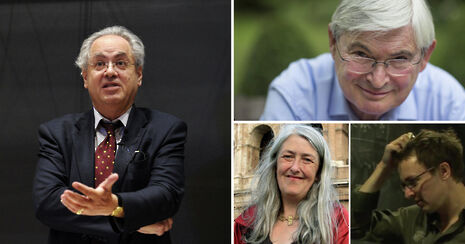Academics seek student input prior to Class Lists decision
Senior academics have spoken out against the university’s moves to abolish Class Lists, calling for further discussion

Voting concerning the public display of Class Lists will take place between late November and early December, with the outcome decided by members of Regent House. Varsity has been able to speak to some of the members on the Regent House roll, including some of those who called for the ballot.
Both Professor Sir Alan Fersht, Master of Gonville & Caius College, and historian Professor David Abulafia called for the ballot. In statements to Varsity, they discussed the importance of tables and marks, for use of comparison. Fersht stated: “I don’t necessarily believe that Class Lists should be externally displayed. But, I do believe that Class Lists and marks should be readily and openly available for internal analysis by colleges without having to jump through hoops for several practical reasons”.
He said that many professors taught students at colleges other than their own, and that information of how these students performed was not only of a personal interest but important when writing references and helping these students get positions. He also said that the data would be useful for judging a college’s effectiveness for teaching and admissions, through analysing how students are performing relative to their peers, as well assessing candidates the college pooled, to further check admission procedures.

Abulafia said that he believed it is “vital to preserve the competitive tables that set out which colleges are succeeding best in which subjects.”
Professor David Tong, a Professor of Theoretical Physics who also called for the ballot, discussed the tradition of the Senate House reading of the Mathematical Tripos results.
“In the past, the ceremony was how mathematicians discovered their grades. These days it is simply a celebration, but one which I think is appropriate.” he said.
“Getting a degree from Cambridge is a huge achievement, regardless of the grade. It requires enormous amounts of hard work and no small talent. My impression is that the vast majority of maths students are pleased to be part of this tradition as a way to recognise their accomplishment”, Tong noted.
However, he added that “ultimately the Senate House ceremony is just a piece of theatre and I’m aware that there are larger issues at stake”, and thus he was happy for his vote to be guided by the outcome of the student referendum.
Professor Mary Beard noted the complexity in establishing whether the Class Lists were good for students or not: “Part of me says that these are what we used to call ‘public examinations’. And my experience has always been that those who did less well than they hoped were actually supported by the public nature of the results. But part of me feels very iffy about people learning what they got from a Senate House pic on Facebook. It isn’t simple.”
The idea of a proper debate and democratic vote was put forward repeatedly. Fersht stated that given the importance of the change, “we must have a proper debate by both faculty and students and not have these changes rushed through”, while Tong noted the student referendum gives the opportunity for all students to voice their opinion.
On the topic of a democratic vote, Abulafia stated: “Irrespective of the arguments for and against Class Lists, I believe that important decisions in the University should be made by its governing body, the Regent House, and not handed down from above.”
John Lister, who also requested a ballot, simply stated he had “no comment to make beyond believing democracy to be a good thing.”
 News / Judge Business School advisor resigns over Epstein and Andrew links18 February 2026
News / Judge Business School advisor resigns over Epstein and Andrew links18 February 2026 News / Hundreds of Cambridge academics demand vote on fate of vet course20 February 2026
News / Hundreds of Cambridge academics demand vote on fate of vet course20 February 2026 News / Gov grants £36m to Cambridge supercomputer17 February 2026
News / Gov grants £36m to Cambridge supercomputer17 February 2026 News / CUCA members attend Reform rally in London20 February 2026
News / CUCA members attend Reform rally in London20 February 2026 News / Petition demands University reverse decision on vegan menu20 February 2026
News / Petition demands University reverse decision on vegan menu20 February 2026









